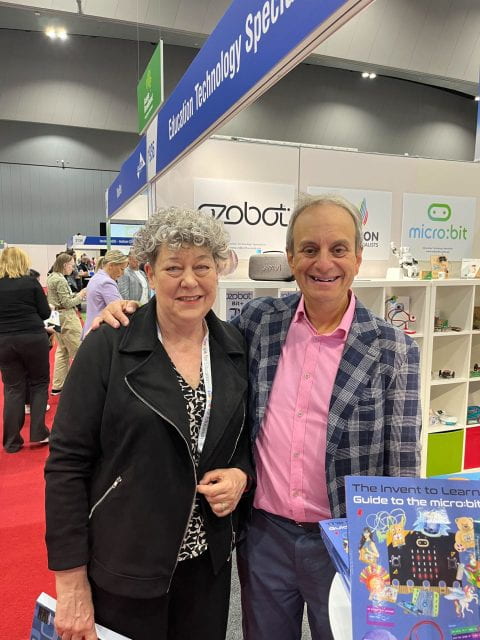
Conversations
EduTech 2023 – Innovation, Flexibility, AI and more!

EduTech 2023 took place in Melbourne on August 24-25. As always it was a huge conference with a large exhibition hall and numerous strands for both practical and theoretical sessions. Although there was a healthy Higher Education strand, the main focus was on K-12 learning and teaching. Presentation and panel sessions were mostly limited to 20 min.
My presentation “Flexible pathways – Providing equivalent opportunities for all learners” can be found online here. About 50 people attended and it seemed to be well received given that flexibility in learning was a key theme. As one follow up James Cook University have reached out for me to do a session with their learning design team to help inform plans to implement flexible learning.
I was also on a Panel and we discussed “Flexible Pathways: Hi-flex, the future of hybrid and digital strategies”. Joining me were representatives from education departments in WA and NSW and Prof Sandra Milligan from the University of Melbourne. What struck me was how insular our education systems are – very state focused and inward looking. An ongoing theme also included in this discussion was how to support student choice (on campus, online) and how to improve online learning to be equivalent to what is typically offered on campus. These discussions are very contextual – to state that at UniMelb the best learning is on campus has no real correlation to our UniSQ experience, being a regional online institution. However I believe a shift in mindset around online learning is required to enable further student choice and autonomy.
I was delighted to attend a session by Prof Sarah Prestridge who shared ideas on flexible modalities for learning. She emphasised we have to provide learning opportunities that are different: learning differently; with different people; in different spaces. She also shared that we need to disrupt the belief that good learning is in the classroom, not online. She advised we need to build good relationships with and between learners – and every learning mode has its challenges and associated strategies to do this. Her clear message (that aligns very much with my thinking / our thinking and actions at UniSQ) is we need to see online as the main ‘space’ or mode for learning, and not as an addon to on campus – and this refers to synchronous but especially asynchronous learning. Her final point was powerful – are we preparing students to function as online workers from home (for example) by making them come to a classroom (this applies to all levels of education).
Innovation was another theme. Saku Tuominen, founder and chair of HundrEd stated “An innovation is an idea that is proven to work” and that implementation of an innovation needs resources – otherwise it will not work. This resonated with the work we are doing at UniSQ.
On the other hand, Dr Gary Stager (full disclosure, who is a good friend of mine) has firm views about innovation (and most everything else of course!). He shared:
“Seeking the holy grail of innovation leads to unfortunate choices favouring novelty over quality and views education transactionally. Individuals and institutions do not get to claim the mantle of innovation. That is for others to judge – over time. Innovation is often marred by an ahistorical egocentrism and distracts educators from establishing and living one’s values. The lure of innovation causes too many educators to seek validation from external forces, often hostile to our mission. History has demonstrated that if something is truly innovative, it is unlikely to be popular. Therefore, showy efforts to gain attention will fail to do so and not make schools a more productive context for learning. We have real work to do and need to keep our competitive impulses in check.”
What are your thoughts about this?

Julie and Gary at his book signing in the trade hall.
There were of course many discussions around AI in education and I attended quite a few – but the message became repetitive from mostly non-inspiring speakers. There is nothing new to report in this space that I heard. UniSQ needs to carry on as planned – exploring the positives for AI in learning and teaching and being mindful of the negatives for academic integrity etc. Overall the mood at the conference in this space was one of anticipation mixed with apprehension. Times are changing….so must we by embracing new ways of working.
Finally I want to share a reflection by a colleague, Madeleine Brookes, working in the K-12 Qld Ed system who also attended – EduTech 2023 – A delegate’s POV. A conference as large as this can be overwhelming, and the short 20 min ‘byte’ sessions leave little time for interaction and digestion of new ideas. Although there was a conference app it seemed that very little socialising on this took place – people I reached out to did not always respond. I was involved in the Learning2 conference experience that she speaks about and ultimately that is a more profound and deeper learning journey than attending something where, to be honest, the trade hall and the company presentations and workshops dominated. We talk about not giving students ‘sit and get’ experiences and yet conferences are still run with this pedagogical approach. Something to think about when we run events at UniSQ (online or on campus).
Play like a Team in Teams
A highlight was hearing Sarah Perstridge discuss her research into student engagement when using MS Teams.Sarah shared how students engage both cognitively and socially and how there is a broad variance of online approaches in higher ed in considering student needs. Paper reference below.
Selected References and Resources
Prestridge, S., & Cox, D. (2023). Play like a team in teams: A typology of online cognitive-social learning engagement. Active Learning in Higher Education, 24(1), 3-20. https://doi.org/10.1177/1469787421990986
David Kellerman from UNSW – creator of the $1.7 mill Digital Teaching Studio: Hybrid = Online and on campus students enriching one another’s educational online experience. See the Student Guide to Hybrid Study.
International Society for Educational Technology (ISTE): AI in Education resource.


0 Comments